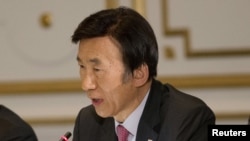As North Korea seems to be gearing up for a controversial rocket launch, there is growing uncertainty about Pyongyang’s capabilities and intent, officials and analysts in Seoul say.
U.S. and South Korean officials have been increasingly concerned in recent months that North Korea may be preparing another long-range rocket launch and nuclear test. Analysts suspect North Korea could fire a long-range rocket to mark the anniversary of the founding of the ruling Workers' Party on October 10.
Recently, North Korea has ratcheted up the rhetoric regarding its missile and nuclear weapons programs. An official at North Korea’s aerospace agency said it would launch a “series of satellites into space” at times and locations determined by the party. North Korea’s state media said the country has restarted all its nuclear facilities.
Intent unclear
However, military officials in Seoul say they have not detected any sign indicating Pyongyang is preparing a rocket launch. Citing recent satellite imagery, 38 North, a North Korea monitoring website run by the John Hopkins U.S.-Korea Institute, said in a report that there’s no sign of preparations for the launch.
Shin In-kyun, a military analyst, said a rocket launch by Pyongyang before the anniversary seems unlikely.
“In order for North Korea to fire a rocket before the anniversary, it has to take a series of steps, such as moving a rocket and erecting it, and injecting fuel into it," Shin said. "We have to see if North Korea takes such actions over the weekend.”
Shin expects Pyongyang to take more time to choose an optimal political environment for the launch.
Kim Kwang-jin, a North Korean defector and researcher at the Institute for National Security Strategy, South Korea’s state-run research institute, said Pyongyang’s action seems inevitable, considering a series of statements it has made.
“It is possible that North Korea will conduct a long-range rocket launch around the party anniversary,” Kim said.
International opposition
Recently, key members of the six-party talks — multistate talks aimed at persuading North Korea to give up its nuclear weapons — have launched an intensive diplomatic campaign to deter Pyongyang’s provocative actions. On Tuesday, top diplomats of the United States, South Korea and Japan met in New York to discuss the North Korean threats.
“North Korea presents an ongoing security challenge to everybody,” U.S. Secretary of State John Kerry told reporters before the meeting.
South Korean President Park Geun-hye called for the denuclearization of North Korea in a highlighted speech to the U.N. General Assembly on Monday.
Last week, Chinese President Xi Jinping said Beijing is opposed to “any actions that might cause tension in the Korean Peninsula or violate U.N. Security Council resolutions,” in an apparent warning to its ally. The rare move was seen as an indication that Beijing may not tolerate Pyongyang’s further provocations.
Nam Gwang-gyu, a professor at Korea University, said Pyongyang cannot ignore a warning from its main economic and political patron.
“Beijing’s participation in the U.N. efforts to sanction Pyongyang has become active after Pyongyang conducted the third nuclear test. Beijing is likely to participate in the efforts even more actively if Pyongyang takes any further provocative actions despite Xi’s warning,” Nam said.
Deterrent options limited
Some analysts question whether diplomatic pressure from its ally would keep Pyongyang from taking provocative actions.
Shin Sang-jin, a professor at Kwangwoon University who specializes in relations between China and North Korea, warned that Beijing’s pressure tactics against Pyongyang could backfire.
“North Koreans might feel they have no other options but to continue on their own path and show it to the Chinese, given that bilateral ties between the two sides are coming under strain,” Shin said.
Shin said Beijing would be reluctant to participate in any U.N. actions that may destabilize Pyongyang.
This week, the United States repeated its call for North Korea to denuclearize.
“North Korea’s leaders have a choice to make: Denuclearize and attain the peace, security and prosperity it is seeking, or stay along the current path and face increasing diplomatic isolation and economic deprivation,” said Anna Richey-Allen, State Department East Asian and Pacific Affairs Bureau spokeswoman.
Pyongyang insists launching a long-range rocket is part of its efforts to advance a space program, but the U.N. Security Council resolutions require Pyongyang to stop conducting any launches using ballistic missile technology.
In December 2012, North Korea successfully fired into orbit a long-range rocket carrying a satellite in what appeared to be a major leap forward in its ballistic missile program.
Baik Sungwon and Jee Abbey Lee contributed to this report, which was produced in collaboration with the VOA Korean service.




